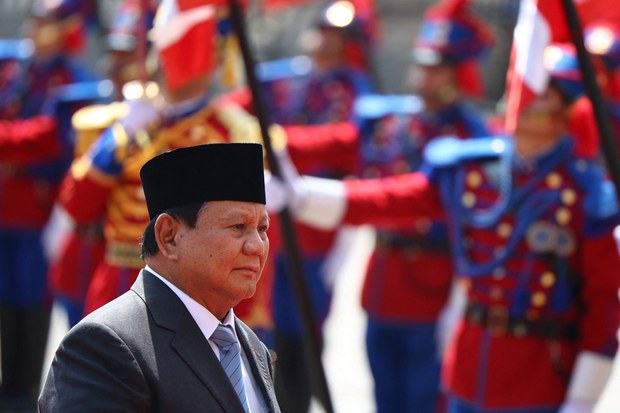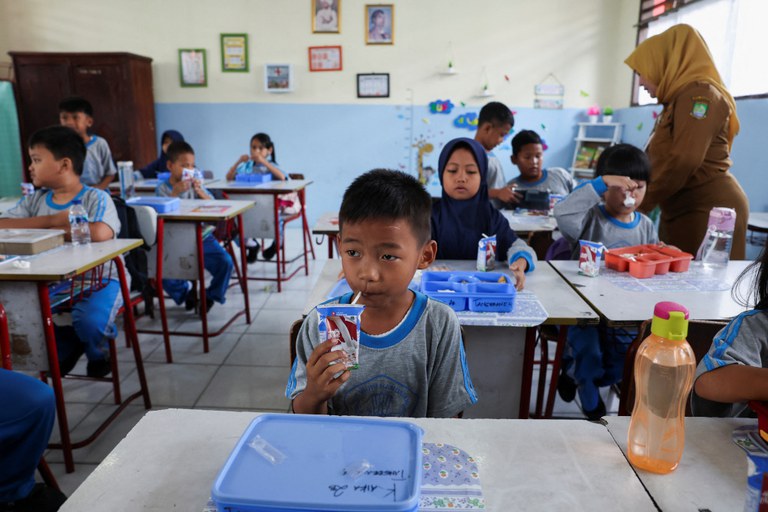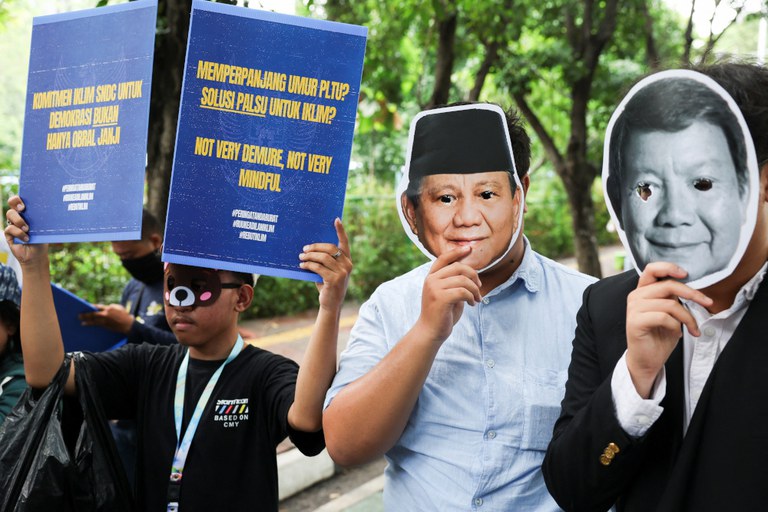Just 5 months in office, Prabowo’s problems pile up
2025.03.28
 Indonesian President Prabowo Subianto arrives at the government palace in Lima to meet with Peruvian President Dina Boluarte, on the sidelines of the Asia-Pacific Economic Cooperation summit, Nov. 14, 2024.
Indonesian President Prabowo Subianto arrives at the government palace in Lima to meet with Peruvian President Dina Boluarte, on the sidelines of the Asia-Pacific Economic Cooperation summit, Nov. 14, 2024.
It wasn’t supposed to be so hard. Prabowo Subianto cruised to victory in Indonesia’s 2024 presidential election, winning 58% in the first round of voting.
Yet only five months after taking office, Prabowo is confronted with a host of compounding challenges and chaotic policy rollouts that have resulted in public protests and market jitters.
The president’s signature campaign promise was a free student-lunch program, a U.S. $29 billion project through the end of his term in 2029. That in itself was going to push government spending above the debt limit and lead to cuts in other social services.
While the program has 80% popular support, its rollout has been chaotic, leaving questions about how it will be paid for.
Prabowo, the former defense minister, also harbors ambitions for military modernization.
For years, defense spending has been 0.7% to 0.8% of GDP, roughly $9 billion. That has limited capital improvements – meaning that over half of the military equipment is antiquated. To get to the Minimum Essential Force targets, Indonesia needs to spend closer to 2.5% of GDP on defense.
In addition, exports have fallen, amidst the cooling of China’s economy even as domestic consumption has fallen as a result of the contracting middle class.

While GDP under President Joko “Jokowi” Widodo, increased from $891 billion in 2014 to $1.371 trillion in 2023, the gains were not equally distributed and the middle class was hard hit.
His successor, Prabowo, announced the launch of a new sovereign wealth fund to support a targeted 8% growth. With the goal of $900 billion in assets under management, Danantara Indonesia would be among the largest in the world, but details about its capitalization have been less concrete.
The fund is expected to take over all government holdings in state-owned corporations including three key banks – Bank Mandiri, Bank Rakyat Indonesia and Bank Negara Indonesia.
Given the country’s endemic corruption and weakening government oversight, the potential for graft has rattled some investors.
All of this uncertainty has battered Indonesia’s financial markets.
On March 18, Indonesia’s main stock index tumbled by 7.1% over concerns about Prabowo’s economic policies and fears of a global trade war. Regulators briefly suspended trading for the first time since 2020.
RELATED STORIES
100 days of Prabowo presidency marked by free-lunch fumble, policy U-turn
Amid pro-democracy protests, Indonesia allows more military officers in civilian posts
Analysts: Ambitious Prabowo needs Sri Mulyani to sustain Indonesia’s hard-won fiscal credibility
In addition, rumors of respected Finance Minister Sri Mulyani’s resignation further scared investors. The holdover from the Widodo administration denied the reports, but given her fiscal discipline and the president’s populist policies, a clash was inevitable.
Indeed, $18.8 billion in proposed spending cuts provoked student protests to erupt nationwide.
Foreign investors have already dumped nearly $1.8 billion in Indonesian stocks in the first quarter of 2025, which led to a 2% decline in the value of the rupiah. The Jakarta Stock Exchange is down 20% from its September 2024 peak and is the poorest performing exchange in the region.
The revised military law
But perhaps what spooked the financial markets the most, was Prabowo’s most significant legislative victory to date: the passage of the revised Military Law last week. The changes will allow the army to claw back many of the civilian authorities that it ceded following the fall of Suharto and the New Order regime in 1998.
Passed in 2004, the Military Law legally ended Dwi Fungsi (the dual function) that gave the military sweeping civilian authorities.
It allowed uniformed military personnel to hold just 10 senior civilian functions in national security, including the minister of defense, coordinating minister of politics and security affairs, and the head of the National Intelligence. Otherwise the military ceded most of its administrative powers and troops returned to barracks.

Under Jokowi, the military began to regain many civilian authorities, including roles in food and internal security, using a new national security concept known as Bela Negara.
The revised law increases the number of positions open to military officials to 15 and greatly broadens the definition of national security to include the coordinating minister of maritime affairs and fisheries, the head of counter-terrorism, and the disaster management agency. The attorney general – the top law enforcement officer – can be a uniformed officer within the military’s chain of command.
The new, amended law could pave the way for military personnel to serve on the boards of state-owned enterprises, which continue to play an outsized role in Indonesia’s economy.
It is seen as the most serious reversal to civilian oversight over the military since the fall of the New Order and is sure to provoke more student unrest.
Papua’s role
The intersection of Prabowo’s populism and security agenda is being played out in the restive province of Papua.
Prabowo served in Papua as a member of the military’s special forces (Kopassus), battling the Free Papua Movement (OPM) – so part of this is unfinished business.
While peace processes in East Timor and Aceh were negotiated, neither the Indonesian government nor the military have any desire to seek a durable political solution in Papua. If anything, Prabowo is doubling down on internal colonial policies.
Papua is key to resolving the country’s chronic food insecurity and Prabowo’s pledge to achieve food self-sufficiency by 2028.
Indonesia imported 3.8 million metric tons of rice in 2023 and over 4 million tons in 2024.
Papua was Prabowo’s first official trip after his Oct. 20, 2024 inauguration. He was filmed driving a large rice harvester in Merauke. Locals have resisted the farms.
On March 23, the Indonesian military announced it redeployed 450 troops from Maluku province to the Papua region, bringing the total to over 20,000 additional troops in Papua, including five newly established battalions, since Prabowo took office.
That announcement came days after reports that one Indonesian transmigrant was killed and seven others were injured by the secessionist Liberation Army. It has declared that all teachers and health workers would be considered as Indonesian soldiers under the new Military Law, creating an exodus in the region.
All of this has only reinforced Papuan beliefs that the territory is under occupation, which has led to a renewed cycle of violence. In short, in trying to solve problems, Prabowo is creating new ones.
Zachary Abuza is a professor at the National War College in Washington and an adjunct at Georgetown University. The views expressed here are his own and do not reflect the position of the U.S. Department of Defense, the National War College, Georgetown University or BenarNews.







